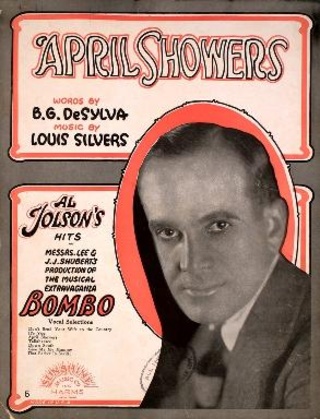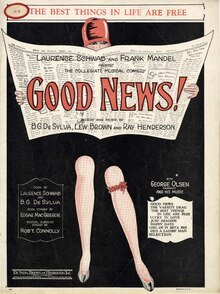"All Alone" is a popular waltz ballad composed by Irving Berlin in 1924. It was interpolated into the Broadway show The Music Box Revue of 1924 where it was sung by Grace Moore and Oscar Shaw. Moore sat at one end of the stage under a tightly focused spotlight, singing it into a telephone, while Oscar Shaw sat at the other, doing the same.

"If You Were the Only Girl (In the World)" is a popular song, written by Nat D. Ayer with lyrics by Clifford Grey. It was written for the musical revue The Bing Boys Are Here, which premièred on 19 April 1916 at the Alhambra Theatre in Leicester Square, London. The song was originally performed as a duet between Lucius Bing, played by George Robey, and his love interest Emma, originated by Violet Loraine.
"Heat Wave" is a popular song written by Irving Berlin for the 1933 musical As Thousands Cheer, and introduced in the show by Ethel Waters.

"Moonlight Bay" is a popular song. It is commonly referred to as "On Moonlight Bay". The lyrics were written by Edward Madden, the music by Percy Wenrich, and was published in 1912. It is often sung in a barbershop quartet style. Early successful recordings in 1912 were by the American Quartet and by Dolly Connolly.
"Let a Smile Be Your Umbrellas" is a popular song.
"I Had the Craziest Dream" is a popular song which was published in 1942. The music was written by Harry Warren, the lyrics by Mack Gordon.
"If You Are But a Dream" is a popular song published in 1942 with words and music by Moe Jaffe, Jack Fulton and Nat Bonx. The melody is based on Anton Rubinstein's "Romance in E flat, Op. 44, No. 1," popularly known as "Rubinstein's Romance".
"It's the Talk of the Town" is a popular song written by Jerry Livingston, the lyrics by Al J. Neiburg and Marty Symes.
"South of the Border Down Mexico Way" is a popular song describing a trip to Mexico, written by Jimmy Kennedy and Michael Carr and published in 1939 for the film of the same name starring country star Gene Autry.

"Please Send Me Someone to Love" is a blues ballad, written and recorded by American blues and soul singer Percy Mayfield in 1950, for Art Rupe's Specialty Records. It was on the Billboard's R&B chart for 27 weeks and reached the number-one position for two weeks; it was Mayfield's most successful song.

"April Showers" is a 1921 popular song composed by Louis Silvers with lyrics by B. G. De Sylva.

"Down Among the Sheltering Palms" is a popular song.
"Early Autumn" is a song composed by Ralph Burns and Woody Herman with lyrics by Johnny Mercer. The song grew out of the fourth segment of Burns's "Summer Sequence" concert piece. The original recording was made by Herman's second herd on December 27, 1947, which had a notable eight-bar solo by saxophonist Stan Getz. Herman asked Johnny Mercer to write lyrics in 1952 and he re-recorded the song taking the vocal duties himself.
"Isn't This a Lovely Day?" is a popular song written by Irving Berlin for the 1935 film Top Hat, where it was introduced by Fred Astaire in the scene where his and Ginger Rogers' characters are caught in a gazebo during a rainstorm. The lyric is an example of a song which turns a bad situation into a love song, a common style for Irving Berlin, as in I've Got My Love to Keep Me Warm and Let's Have Another Cup of Coffee.
"Along the Navajo Trail" is a country/pop song, written by Dick Charles, Larry Markes and Eddie DeLange in 1945, and first recorded by Dinah Shore in May 1945.
"Waves of the Danube" is a waltz composed by Iosif Ivanovici in 1880, and is one of the most famous Romanian tunes in the world. The song has many variations throughout the piece, reminiscent of the music of Johann Strauss. Through the Viennese style variations, there is still a distinct Slavic style. In the United States, it is frequently referred to as "The Anniversary Song", a title given by Al Jolson when he and Saul Chaplin released an adaptation of the song in 1946.

"Alabamy Bound" is a Tin Pan Alley tune written in 1924, with music by Ray Henderson and words by Buddy DeSylva and Bud Green. It was popularized by Al Jolson and included in the musical Kid Boots, where it was sung by Eddie Cantor. Successful recordings of the song were released in 1925 by Paul Whiteman, Isham Jones and Fletcher Henderson (instrumentals), as well as Blossom Seeley, whose vocal version reached number 2 on the charts. The song has sold over a million copies of sheet music and has been included in several films over the years.

"Way Down Yonder in New Orleans" is a popular song with music by John Turner Layton Jr. and lyrics by Henry Creamer. First published in 1922, it was advertised by Creamer and Layton as "A Southern Song, without A Mammy, A Mule, Or A Moon", a dig at some of the Tin Pan Alley clichés of the era.

"In the Good Old Summer Time" is an American Tin Pan Alley song first published in 1902 with music by George Evans and lyrics by Ren Shields. The song is in the public domain.
"Careless Hands" is a popular song written by Carl Sigman and Bob Hilliard, and first recorded in 1948.








